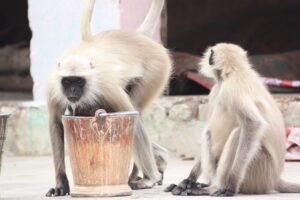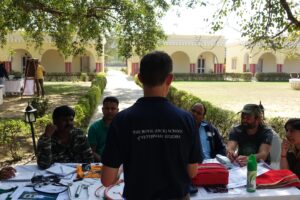An SOS for nature
The health of our wildlife and conservation of biodiversity are fundamental components of a One Health approach. In this blog, Neil Anderson, Katie Beckmann and Gidona Goodman set out the major challenges facing the field and highlight education and research opportunities to move towards stronger wildlife health systems.

2020 was expected to be a very big year for conservation. With many large meetings and events planned, including the UN Climate Change Conference of the Parties (COP26) in Glasgow, it was hoped that the spotlight would be shone brightly on the dual climate and biodiversity crises we currently face.
The emergence of SARS-CoV2 has shifted the spotlight, and the world has been struggling to come to terms with the impact of this global pandemic ever since. The impact on conservation programmes has been severe with many struggling to continue their field activities and obtain sufficient funding to survive. There is much concern about the potential introduction of the virus into endangered great ape populations, which may be highly susceptible.
Ecological changes
The emergence of this virus is symptomatic of the widespread ecological changes occurring at an alarming rate across the globe.
The Intergovernmental Science-Policy Platform on Biodiversity and Ecosystem Services (IPBES) Global Assessment recently concluded that approximately one million animal and plant species are at risk of extinction (IPBES, 2018).
The Living Planet Report (2020) provides stark reading in what it describes as ‘an SOS for Nature’ (WWF, 2020). Using the Living Planet Index to monitor the abundance of species, it describes an average 68% decline in mammals, birds, amphibians, reptiles and fish from 1970-2016. This has been largely driven by the growth in human populations and the resulting modification of habitats and over-utilisation of resources.
Wildlife health and disease emergence
Disease can play an important role in the decline of wildlife populations, particularly when acting alongside other causes of decline. The most notable example of this in recent years is the fungal disease chytridiomycosis which has devastated many amphibian populations around the world, causing the decline of over 500 species and the presumed extinction in the wild of at least 90 species.
Non-infectious diseases have also played an important role in declines of many species, a good example being that of diclofenac poisoning in Asian vultures. Diclofenac is a painkiller and anti-inflammatory drug commonly used in people and also used to treat domestic livestock in some parts of the world. Vulture populations are highly sensitive to its effects and populations in India and Nepal have come close to extirpation as a result of environmental exposure.
As advocates of One Health we know that many disease of wildlife will also infect domestic livestock and humans. Therefore, as well as threatening the health of wildlife, disease transmission across species also exposes humans to zoonotic disease risks and frustrates attempts to control disease in domestic livestock.
There have been multiple disease emergence events in humans in the past two decades with a postulated wildlife source. Examples include SARS-CoV1, MERS, Nipah virus, Hendra virus and the Ebola virus outbreak in West Africa. In most cases the factors and processes driving these emergent events are only just starting to be understood. There is a vast diversity of infectious agents naturally occurring in animals, including both wildlife and domestic species, and they are an important part of ecological systems.
Changing land use
Ecosystems are inherently complex and disease emergence is a natural evolutionary process which has always occurred. What has changed in recent years is the dramatic increase in human and domestic animal populations, often at the expense of wildlife populations. This has promoted a significant change in land-use patterns and altered the nature of contact between humans and animals. The high density of human and domestic animal populations, often living in close proximity, and the highly connected nature of the world today means that isolated spillover events can rapidly emerge to become global pandemics. As highlighted in the very recent IBPES report on Biodiversity and Pandemics, there is now a strong body of evidence illustrating how ecological disturbance, and associated biodiversity loss, has driven the emergence of novel infectious disease (IPBES, 2020).
Much has been discussed about the role of One Health in preventing zoonotic disease emergence. Indeed, the risk of pandemics has been discussed widely within One Health for decades and it was the original SARS outbreak (now termed SARS-CoV1) and concerns about the risks posed by highly pathogenic avian influenza that really galvanised action on One Health in the early 2000s.
However, it seems that the broader international community needed a lived experience to realise the full implications of disease emergence, and the need for better policies and systems to reduce this risk.
Towards stronger wildlife health systems
Despite the need for a better understanding of wildlife health, it has long been neglected in comparison to the human and domestic animal health sectors. Although good wildlife health systems have been recognised as being an important component of One Health approaches (Skerratt, 2020), financial and structural support has often been lacking. The Co-Chairs of the IUCN SSC Wildlife Health Specialist Group have recently called for the creation of a new Global Wildlife Health Authority (Karesh W, 2020). This new authority would adopt a One Health approach working alongside the World Health Organization (WHO) and World Organisation for Animal Health (OIE) to ‘manage disease threats to and from wild animals, including at the interface between human, domestic animal, and wild animal populations’.
The old saying that ‘prevention is better than cure’ applies as much to disease emergence as it does to the health of people. Having improved systems to support biodiversity conservation and ecological protection will do much to prevent disease emergence. Enhanced wildlife health systems will also enable early detection of new outbreaks in animal reservoirs before transmission occurs to people, a key factor in controlling them effectively. Controlling outbreaks at their source results in more effective disease control measures, and this principle has directed efforts over many years to control foot and mouth disease in the veterinary sector.
Training, education and research

Trained professionals are the core of any wildlife health system. Many opportunities now exist for specialised training, particularly at the postgraduate level. Many veterinarians have a strong interest in conservation, but need opportunities to develop their skills to work in this area.
In 2012, the University of Edinburgh initiated an online MVetSci programme in Conservation Medicine. In common with the One Health concept, Conservation Medicine promotes an interdisciplinary approach to the health of humans, animals and the ecosystems supporting them. The programme is designed to provide the skills, knowledge and networks required to be effective practitioners of conservation medicine and has produced graduates from across the globe, many of whom are making significant contributions to One Health and conservation.
Recognising the need for training opportunities for professionals from all backgrounds, we also developed a One Health MSc in 2014. A wide variety of choice in courses is provided under the umbrella of the Global Health Academy, allowing students to pursue interests in human health, animal health or ecosystem health and conservation within the programme.
Wildlife Health Bridge
In collaboration with partners at the Zoological Society of London, Royal Veterinary College, Wildlife Institute of India and University of Melbourne, we also help to deliver a project called the Wildlife Health Bridge. Initiated in 2009, it works to improve the training and education of wildlife health professionals, providing particular support for those in biodiverse, low-resource settings.
A key component of the Wildlife Health Bridge is the Interventions in Wild Animal Health course (https://iwah.org/). This is a residential course which takes place each year in Sariska National Park in Rajasthan, India. It provides a unique training opportunity for wildlife vets from South Asia to study alongside wildlife vets from around the world and MVetSci Conservation Medicine students.
Teaching covers many practical techniques required to be effective wildlife health practitioners including population monitoring, disease investigation, and capture and anaesthesia of wildlife and there is a rich cultural exchange. Graduates from this course have the opportunity to become part of our Wild Animal Alumni organisation. This is an international knowledge exchange network of graduates from four Masters-level courses in the wild animal health field run by the partners of the Wildlife Health Bridge.
Research advances
Advances in research are also key to achieving better wildlife health outcomes. Large investments have been made in the search for agents with the potential to jump species into the human population. Modern genetic technologies have revolutionised our ability to screen large numbers of samples relatively cheaply, providing data on the broad diversity of infectious agents present in wildlife. However, it has never been more important to support strong localised wildlife health systems and parallel conservation action, as professionals who work at the frontline of disease detection and wildlife conservation
Embedding wildlife health within One Health approaches
Strengthening the incorporation of wildlife health within One Health approaches will have many benefits. Alongside more effective control of emerging infectious diseases and the risk they pose to humans, it will also help us to address many wider societal and environmental challenges. Understanding wildlife health is necessary for public health and conservation.
The COVID-19 pandemic has clearly illustrated the need for a more holistic, ecological approach to health and development focussed on the principles of One Health. Wildlife health and conservation should be firmly embedded within this.
About the authors
Neil Anderson is a Senior Lecturer in the Royal (Dick) School of Veterinary Studies. He is also Programme Director of the Conservation Medicine MVetSci and One Health MSc programmes. Neil’s teaching and research activities are focused on applying One Health principles to promote wildlife health and support the conservation of biodiversity. He is chair of the Scientific Advisory Panel for the South of Scotland Golden Eagle Project and provides veterinary support for this, and other, conservation and wildlife research projects.
Katie Beckmann is a Lecturer in Wildlife Health and Conservation Medicine. Her research interests are focused on informing conservation practice and wildlife health management. Katie is a European Veterinary Specialist in Zoological Medicine (Wildlife Population Health) and a member of the International Union for Conservation of Nature Species Survival Commission’s Conservation Translocation Specialist Group.
Gidona Goodman is a Lecturer in Wildlife Health and Conservation Medicine. Gidona’s work focuses on avian wildlife health and conservation projects and supporting and training local scientist in animal related field work
Conservation science at the University of Edinburgh
Follow the links below to find out more about the Conservation Science group at the University of Edinburgh and the training opportunities we offer in wildlife health and conservation.
Links and references
IPBES 2018: The IPBES assessment report on land degradation and restoration.
IPBES 2020. IPBES Workshop on Biodiversity and Pandemics.
Crossroads Blog | Open Letters to IUCN Members 2020. It is Time for a Global Wildlife Health Authority.
WWF 2020. Living Planet Report 2020.




Comments are closed
Comments to this thread have been closed by the post author or by an administrator.